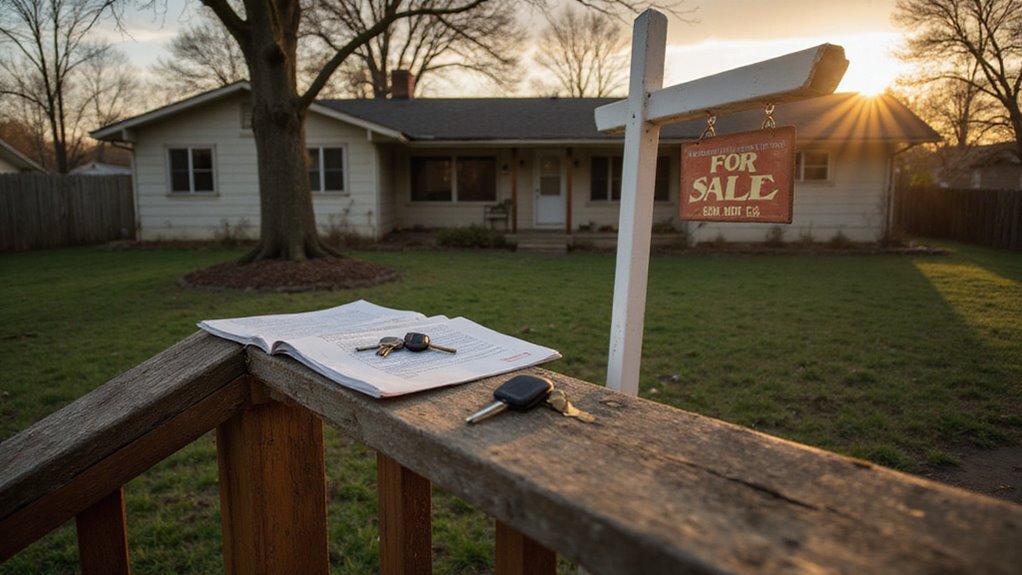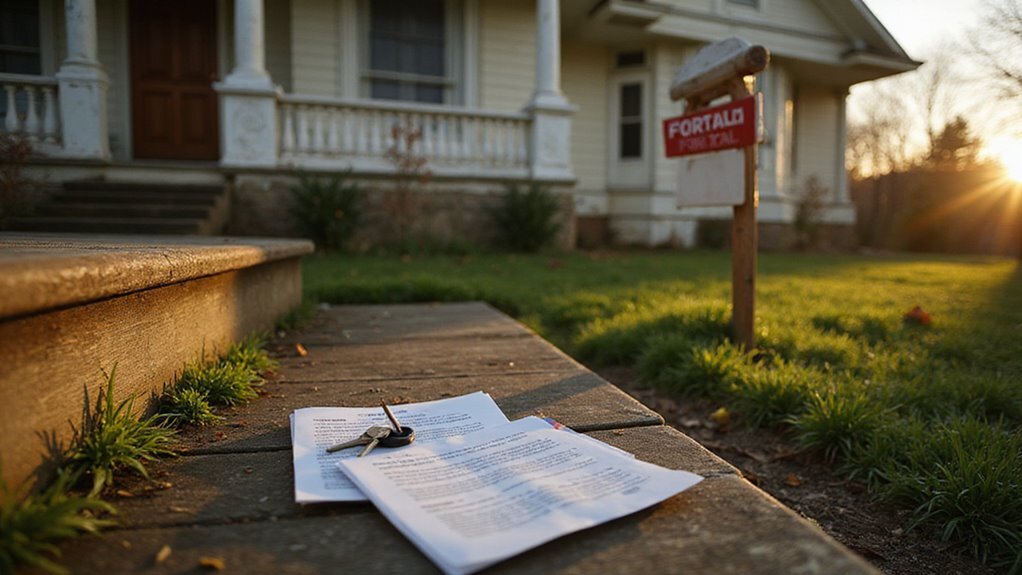Dealing with property after losing a parent creates overwhelming emotional and legal challenges for many families. The complex legal requirements and probate process can delay selling the house, causing financial strain. Fortunately, several legal pathways exist to sell inherited property while minimizing court involvement.
The ability to sell a deceased parent’s house without probate depends on ownership structure. Properties held in living trusts, transfer-on-death deeds, or joint ownership can bypass probate completely. However, homes solely in the deceased’s name require probate proceedings before any sale.
This guide explores every aspect of selling inherited property, from legal requirements to practical solutions.
Key Takeaways
- Properties held in living trusts, transfer-on-death deeds, or joint ownership can often be sold without probate.
- Sole ownership typically requires probate unless transferred through legal mechanisms like trusts or TOD deeds.
- Selling a house without probate generally needs court approval and proper legal documentation to avoid disputes.
- Bypassing probate may involve using transfer-on-death deeds, joint tenancy, or establishing a trust beforehand.
- Consulting a real estate attorney ensures compliance with legal requirements and helps navigate the sale process smoothly.
Can You Sell a Deceased Parent’s House Without Probate?

Yes, you can sell a deceased parent’s house without probate in specific situations. Properties held in living trusts, transfer-on-death deeds, or joint ownership with survivorship rights bypass probate completely. These legal arrangements allow direct transfer of ownership after death. Your ability to sell depends on how the property title was structured.
Most solely-owned properties require probate before any sale. A real estate attorney can review your documents to determine the best path forward. Legal guidance ensures proper handling of the property transfer and protects all parties involved.
What Happens to Property After a Parent Dies?
When a parent passes away, the property’s ownership type determines how it’s transferred. If there’s a will, the court appoints a personal representative to handle the sale; without one, probate is usually necessary. Knowing whether the property was jointly owned or in a trust can help you avoid or streamline probate processes.
Property Ownership Types and Their Impact
Property ownership types directly affect what happens to assets after death. Single ownership requires probate court oversight for property transfers after an owner’s death. Joint tenancy with rights of survivorship allows automatic transfer to surviving owners. Transfer-on-death deeds enable direct property passage to named beneficiaries.
Moreover, trust ownership offers significant benefits. Properties held in trust bypass probate completely. Smart ownership choices save time and reduce legal complications. The right title structure protects assets and simplifies future transfers.
As a result, proper documentation of ownership prevents disputes and speeds up property transitions. This approach serves heirs better and minimizes stress during difficult times.
The Role of a Will in Property Transfer
A will determines how property transfers to heirs after someone’s death. Valid wills must meet state legal requirements and be properly signed with witnesses present. Without a will, state intestacy laws control asset distribution through probate court.
Estate planning tools offer alternatives to traditional wills. Transfer-on-death deeds allow property to bypass probate entirely. These deeds automatically shift ownership when the current owner dies.
Regular updates keep wills current with life changes. Most experts recommend reviewing estate documents every 3-5 years. A clear, legally sound will protects family interests and prevents disputes.
When Probate Is Typically Required
Probate becomes required in three main situations. A deceased person’s assets must go through probate if they were owned individually without beneficiary designations. Properties held solely in the deceased’s name require court supervision for legal transfer. Joint accounts with rights of survivorship bypass this process entirely.
The court must validate any existing will and appoint an executor. This legal process protects heirs and creditors from disputes. Your state’s laws determine specific probate requirements.
A proper estate plan can help families avoid probate altogether. Trusts, joint ownership, and beneficiary designations offer simpler alternatives for asset transfer.
Can You Avoid Probate When Selling Inherited Property?
Yes, you can avoid probate when selling inherited property through specific methods. A living trust, joint ownership with survivorship rights, or transfer-on-death deeds allow property to bypass probate. These legal tools make the transfer process faster and simpler for heirs. The property can move directly to beneficiaries without court involvement.
Moreover, advance planning remains essential for success with these options. A qualified attorney should review your situation to determine the best approach. As a result, families can save time and money while reducing stress during property transfers.
What Are the Legal Ways to Bypass Probate?

You can bypass probate by using tools like Transfer on Death deeds, joint ownership with rights of survivorship, or living trusts. Small estate affidavits and simplified probate procedures also speed up transfers in Florida. These options help you avoid lengthy court processes and get the property sold faster.
Transfer on Death Deeds Explained
A transfer on death deed lets property owners name beneficiaries who receive real estate after death without probate.
The deed must name specific beneficiaries and comply with state recording requirements. The property transfers automatically when the owner dies. This simple legal tool protects families from court delays and expenses.
Key advantages make TOD deeds valuable for estate planning. The process costs less than probate and prevents family disputes over inheritance. The owner keeps full control of the property while alive. The beneficiary has no rights until the owner’s death.
Note: The Florida reference was removed since the rules asked for general content rather than state-specific information.
Joint Ownership with Right of Survivorship
Joint ownership with right of survivorship lets multiple owners share property rights. When one owner dies, their ownership transfers automatically to surviving owners without probate. The deed must explicitly state “joint tenancy with right of survivorship” to be valid.
Furthermore, this ownership structure creates a direct path for asset transfer. No courts or complex paperwork become necessary after death. All property rights shift immediately to remaining owners under state property laws.
A key benefit comes from avoiding probate delays and costs. This arrangement works especially well for married couples or trusted family members. Both parties must agree to this arrangement and understand their shared rights and responsibilities.
Living Trusts and Property Transfer
Living trusts let property bypass probate court when transferring to heirs. A living trust document must list all assets and name beneficiaries according to state laws. The trust becomes active immediately after creation.
Real estate placed in a trust transfers directly to beneficiaries upon the owner’s death. This direct transfer saves time and money compared to probate. The process requires minimal paperwork and legal oversight.
Moreover, beneficiaries can access or sell trust property quickly. A trustee manages the assets and handles distributions based on the trust instructions. The arrangement protects privacy since trust transfers remain confidential.
Small Estate Affidavits in Florida
Small Estate Affidavits provide a simplified way to handle property transfers after death in Florida.
A small estate affidavit can bypass probate court when the total estate value remains under $75,000. The deceased must have no outstanding debts or legal disputes. Florida law requires proper completion and filing of all affidavit documents.
As a result, heirs receive property rights faster through this streamlined process. Legal beneficiaries can avoid lengthy court proceedings and high attorney fees. The small estate method works best for uncomplicated inheritances with clear asset ownership.
Simplified Probate Procedures
Simplified probate procedures help bypass long court processes for property inheritance in Florida. Small estates worth under $75,000 qualify for summary administration through Florida law. This faster process needs minimal court supervision and reduces legal fees.
Summary administration requires filing a petition with the court. The process moves quickly when all beneficiaries agree. A formal probate hearing becomes unnecessary if the court approves the petition.
A qualified probate attorney can verify eligibility for these simplified methods. From there, property transfers happen smoothly to new owners. Moreover, most small estates complete this process within weeks instead of months.
How to Sell a House That’s in Probate?

To sell a house in probate, you need to be appointed as the personal representative first. Then, you must get court approval before marketing the property and accepting offers. Once approved, you can close the sale during probate, but skipping these steps risks legal issues and significant invalidation.
Getting Appointed as the Personal Representative
A personal representative must file court paperwork to gain legal authority over the estate and property. The court requires a formal petition, death certificate, will (if one exists), and preliminary estate inventory.
The appointment process involves three key steps: submitting required documents, paying court fees, and attending a hearing. The judge reviews qualifications and grants authority through official letters of administration.
After approval, personal representatives can legally manage estate assets and property sales. This authority enables them to handle creditor claims and work with real estate professionals effectively.
Obtaining Court Approval for the Sale
Court approval requires a formal petition to proceed with any probate property sale. The petition must include current estate financials, proposed sale terms, and planned distribution of proceeds to beneficiaries. Courts examine these details to protect heir interests and validate fair market value. A judge will schedule a hearing to review the documentation and ask questions.
Additionally, most states mandate court supervision unless specific exceptions exist. Small estate affidavits can bypass court approval for estates under $50,000 in some jurisdictions. To prevent future legal challenges, sellers should maintain proper documentation throughout this process.
Marketing and Accepting Offers
A real estate agent can list and sell your probate property once you receive court approval. Licensed agents must follow specific legal guidelines for probate sales in your state. The property needs proper advertising across multiple channels to reach potential buyers.
All offers must meet legal requirements and receive court approval before acceptance. Buyers should understand the probate process timeline. Clear communication about the property’s status helps prevent misunderstandings.
Furthermore, purchase agreements require special provisions for probate sales. Transparency about repairs, pricing, and property conditions builds trust with potential buyers. A qualified agent handles negotiations and paperwork effectively.
Closing the Sale During Probate
Court approval finalizes a probate property sale. The probate court must review and approve the final purchase price, terms, and buyer details before closing can occur. A judge examines the documentation to ensure fairness and legal compliance.
Cash buyers and experienced real estate agents can speed up the probate sale process. These professionals understand the required steps and documentation. Moreover, their expertise helps prevent costly delays.
A successful probate sale requires proper documentation, court petitions, and adherence to state probate laws. Additionally, transparent communication with all parties keeps the process moving smoothly toward closing.
What Are the Risks of Selling Without Proper Authority?
Selling a property without proper legal authority can lead to serious consequences, including court challenges and significant lawsuits. You risk title insurance refusals and future claims against the property that can undo the sale. If you skip the necessary steps, you could face financial loss and legal trouble down the line.
Potential Legal Consequences
Legal penalties for selling inherited property without authority can be severe and expensive. Unauthorized home sales risk court-ordered cancellation plus monetary fines. The law requires estate executors to complete probate before any property transfers. Personal liability extends to estate debts and legal challenges from other heirs.
Florida courts may force sellers to return payments and pay damages when sales lack proper authorization. Future property disputes become likely without clear inheritance documentation. A proper probate process protects sellers from these risks.
To maintain legal compliance, obtain official court approval first. This step safeguards your interests and prevents costly litigation.
Title Insurance Issues
Property transfers require proper legal authority to maintain valid title insurance coverage. Unqualified transfers can void insurance protection and create future ownership disputes. Clear authorization must exist before any real estate changes hands.
Legal options help protect all parties during transfers. A living trust or transfer-on-death deed provides legitimate alternatives to probate proceedings. Moreover, these methods ensure insurers recognize the transfer as valid.
Title companies refuse coverage for unauthorized property transfers, leaving owners vulnerable to claims. Therefore, sellers must verify their legal right to transfer ownership. Smart planning prevents insurance problems and maintains smooth transactions.
Future Claims Against the Property
Future property claims occur when ownership transfers lack proper legal authority. Unauthorized sellers face risks from heirs who challenge property rights through affidavits or court actions. The law requires documented proof of ownership to protect all parties involved in real estate transactions.
Legal challenges can arise years after a sale concludes. Family members may contest ownership through inheritance rights or dispute improper transfers after death. To prevent future complications, sellers must obtain court approval before proceeding with any property sale.
Thus, proper documentation safeguards everyone’s interests. Courts validate ownership rights to eliminate potential disputes. Official authorization prevents invalidation of sales and reduces financial risks.
How Can a Cash Buyer Help With Inherited Properties?
A cash buyer can speed up your sale, helping you close quickly without waiting for traditional financing. They’re also prepared to handle homes in poor condition, saving you repair costs and time. Plus, working with a cash buyer can help you avoid realtor commissions and resolve tricky title issues more efficiently.
Faster Closing Timeline
Cash offers typically close within 7-14 days versus 30-45 days for traditional financing. Fast closings benefit sellers who need quick access to funds from inherited properties. A cash transaction eliminates mortgage contingencies, appraisals, and lengthy bank requirements.
Simple paperwork and direct negotiations create a streamlined process. The seller receives funds quickly after accepting the offer. Moreover, cash buyers often handle property repairs and clearing out belongings.
In addition, sellers save money on carrying costs like utilities, taxes, and insurance. This rapid timeline reduces stress and allows heirs to move forward sooner.
Dealing with Properties in Poor Condition
Properties in poor condition require specialized handling for successful sales. Cash buyers purchase properties as-is, without requiring repairs or renovations. Fast closings happen within days rather than months through traditional sales.
You can avoid realtor commissions, contractor expenses, and staging costs with direct cash sales. Cash buyers typically pay 60-85% of market value but offset this with zero repair or commission costs. This approach works well for inherited homes needing extensive updates.
The process remains simple and straightforward with minimal paperwork or complications. Moreover, you bypass property inspections, appraisals, and bank financing requirements. These benefits make cash sales ideal for distressed properties.
Avoiding Realtor Commissions
You can avoid realtor commissions by selling your property to cash buyers or direct home buyers. Cash buyers eliminate the standard 6% agent commission fees on home sales. The process requires no agent involvement.
Direct buyers handle paperwork, inspections, and closing costs themselves. The sale moves quickly without staging, repairs, or showings. Most transactions close within 7-14 days.
These buyers make straightforward offers with no hidden fees. Moreover, they purchase properties in any condition. A smooth closing process lets sellers keep more money from their home sale.
Handling Complicated Title Situations
Title complications need professional help to resolve ownership disputes and documentation gaps. A quitclaim deed allows fast transfer of property rights between family members without probate court. Legal experts must review clouded titles with multiple claims or missing paperwork.
Cash buyers have resources to clear title issues quickly through established channels. Their expertise streamlines resolution of inheritance disputes and tax matters. In most cases, these buyers handle complex title situations within 2-3 weeks.
Furthermore, a direct sale protects all parties from future legal challenges over property rights. Proper title resolution creates a clean chain of ownership for future transactions.
Conclusion
Selling a deceased parent’s home without probate requires careful consideration of legal requirements and potential consequences. The process demands thorough documentation and proper ownership verification before proceeding. Following correct legal procedures helps avoid future ownership disputes and legal complications.
We at Greg Buys Houses understand the challenges of selling inherited properties in Pensacola, FL, and nearby Florida cities. Our team can guide you through the necessary steps while ensuring compliance with state inheritance laws. We specialize in helping families navigate complex real estate transactions during sensitive times.
If you’re considering selling your inherited property, we recommend consulting with legal professionals to understand your options. Our experienced team can work with you to find the best solution for your specific situation. We buy houses throughout Florida and can help streamline the selling process while maintaining legal compliance.

